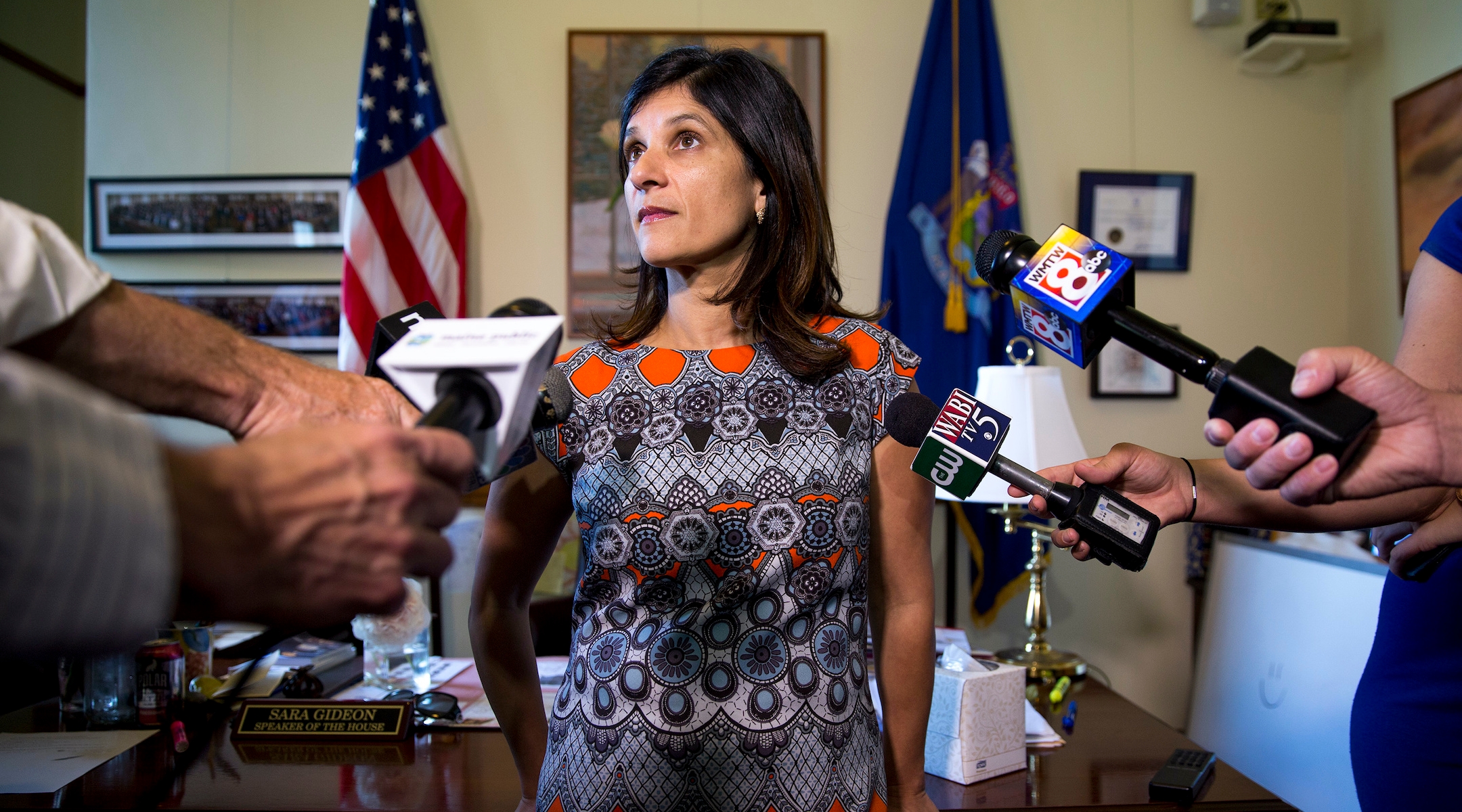(JTA) — Lou Kornreich’s Shabbat table is a microcosm of the Maine Jewish community, of the national Jewish community, of Maine and of the nation. And he doesn’t like it.
“When I have a discussion at the Shabbos table, there are those on the left who are angry at Susan and those on the right who staunchly support her,” the retired judge told me this week, describing increasingly fraught Friday night meals in Bangor.
The intensity unsettles him.
“It’s just politics,” Kornreich said.
“Susan” is Susan Collins, the 67-year-old Maine Republican who is seeking a fifth term in office and for years has traded on her reputation as a moderate to win support from independents and some Democrats.
It’s a formula that may no longer work in the polarized age of President Donald Trump, whom Collins voted to acquit during his January impeachment trial. A poll this week showed Sara Gideon, the 48-year-old Democratic speaker of the Maine House, leading Collins by 4 points, just outside the 3.1 percentage point margin of error.
Democrats nationwide think Gideon has momentum (first she has to clear a primary on Tuesday, but she is the favorite). They have been pouring money into her campaign, and she has outraised Collins $23 million to $16 million, according to Open Secrets.
It’s been a steep drop for Collins: In her last election, in 2014, she won with 68% of the vote.
It’s also an election that has excited unusual attention among Maine Jews, who number 10,000-15,000, and national political Jewish organizations — and not just because Gideon is married to a Jewish lawyer. Here’s why.
A core race in the quest to control the Senate
Democrats are four Senate seats away from control of the upper chamber — three if Joe Biden wins the presidential election and his vice president becomes the deciding vote. There are 35 seats up for election, 23 with Republican incumbents and 12 with Democrats, and anywhere between five and nine are seen as likely to flip — just one of them a vulnerable Democrat, Doug Jones of Alabama. The GOP states seen as most vulnerable are Arizona, Colorado, North Carolina, Iowa, Kansas, Georgia, Montana — and Maine.
The expectation among Democrats now is that the party’s factions set aside differences and support the likeliest Democratic flippers, and that’s no less true for Jewish Democrats. And after a bruising primary season that has created some odd bedfellows, the political action committees associated with J Street, the liberal Jewish Middle East lobbying group, and the Democratic Majority for Israel, aligned with more centrist policies on Israel, are all in for Gideon in Maine.
That’s notable because the two groups clashed during primaries over tactics and policy. Gideon is a relative centrist on Israel, and so are others that J Street PAC is backing this cycle in Arizona and Colorado.
Jeremy Ben-Ami, J Street’s president, said competitiveness was a primary factor in determining whom to back. (The importance of a PAC’s endorsement is not just in its direct contributions, but the signal it sends to donors with an ideological affinity to the PAC.)
“It’s always been J Street’s strategy that we would use our fundraising ability to move millions of dollars through competitive candidates to help them win,” he said.
The PAC, which has raised nearly $200,000 for Gideon and hopes to reach $300,000, is backing her primarily because she brings Democrats closer to taking the Senate, said Ilya Braverman, J Street’s national political director. He likened the group’s support for Gideon to J Street PAC’s pledge to dedicate $1 million to help elect Biden, who differs with the group on some issues.
“Without winning those (seats), you’ve really got a hard path to transforming the Senate, which is one of our top electoral priorities besides defeating Donald Trump by electing Joe Biden — transforming the Senate to make sure that we have a pro-Israel, pro-peace majority,” Braverman said.
The Democratic Majority for Israel PAC’s president, Mark Mellman, said in an email that Gideon is “the best chance we have of defeating Susan Collins, who traded her reputation for independence for full membership in the Donald Trump fan club.”
Mellman, whose PAC is transitioning from spending on the primaries to the general election, said he does not yet know how much the Democratic Majority for Israel will spend on Gideon.
Kavanaugh, Kavanaugh, Kavanaugh and impeachment
There was a time that Jewish political donors — like Jewish voters, a mostly liberal cohort — were open to backing Republicans. One litmus test for donors was where the Republicans stood on reproductive choice. One by one, as the political arena became more polarized, pro-choice Republicans either quit (Sen. Olympia Snowe of Maine) or were ousted (Sen. Mark Kirk of Illinois).
Collins was the last woman standing, at least in the Senate, and she fell two years ago by her own sword — by the lights of these donors — when she voted to confirm Brett Kavanaugh as a Supreme Court justice. Collins said at the time that she believed Kavanaugh would not support cases that undermine the Roe v. Wade precedent establishing abortion rights.
But last month, Kavanaugh dissented on a majority opinion that overturned a Louisiana law that might have shut down abortion clinics in the state. Gideon has used that vote against Collins in her campaigning, and it resonates for Jewish donors.
“Susan Collins was our last Republican, I mean, she made us bipartisan,” said Hollis Wein, the director of communications for JACPAC, a Midwestern Jewish PAC that focuses on reproductive rights, church-state separation and Israel.
“Sadly, Susan made it very easy for us to walk away when she supported [Neil] Gorsuch,” a Supreme Court justice named in 2017, “and then Kavanaugh. She had really good votes, we met with her, we had a good relationship with her, she was pro-choice, but after she chose to support those two Supreme Court nominees, to us it was clear that she was no longer in our corner and that she was no longer pro-choice.”
The Kavanaugh vote was especially fraught. Accusations that he committed sexual assault as a teenager divided Democrats and Republicans, and Trump made the vote a test of loyalty. One Republican, Lisa Murkowski of Alaska, effectively opposed Kavanaugh. Two more from the party could have nixed his nomination, and expectations were high that Collins would be one of them.
A similar dynamic played out this year with the Senate trial on Trump’s impeachment for soliciting Ukraine’s assistance in campaigning against Biden. A lone Republican, Mitt Romney of Utah, voted to convict, with Collins and a handful of Republicans waiting until the last moment to join in acquitting Trump.
Halie Soifer, the director of the Jewish Democratic Council of America, whose PAC also is backing Gideon, said Collins would forever be haunted by her claim after the conviction that Trump “learned” from the ordeal and will be “much more cautious.” His angry purge of impeachment witnesses since then suggests otherwise.
“The only lesson he learned was that he can get away with breaking the law and Republicans like Susan Collins will give him a pass,” Soifer said.
Aaron Keyak, a Democratic consultant who is on the Biden team, said any association with Trump was enough to bring out Jewish Democratic opposition.
“Trump is such a unique threat that there is no compromise with people who are supporting him,” he said.
The Israel question
Gideon won’t offend anyone in the Democratic mainstream when it comes to Israel. Her statement on Israeli plans to annex parts of the West Bank condemns the prospect, but does not threaten any repercussions — even as Democrats increasingly are prone to say out loud that Israel could pay a price in how assistance is delivered if it goes ahead with annexation.
“Unilateral annexation by the Israeli government is a dangerous step that threatens the security of Israel and its neighbors, and puts the goal of a two-state solution at risk,” she said in a list of statements by competitive Democrats compiled by J Street and posted by Jewish Insider. “As Israel’s closest friend and ally, the United States should speak out against this plan and work with the Israeli government to foster the circumstances necessary for a stable and enduring peace that protects the human rights of Israelis and Palestinians.”
Earlier this year Gideon, as Maine’s House speaker, took the lead in passing a resolution that recognized the International Holocaust Remembrance Alliance’s definition of anti-Semitism. That definition includes some forms of attack on Israel, stirring controversy on the left.
The Republican Jewish Coalition’s PAC has endorsed Collins, and she still commands loyalty from pro-Israel donors who eschew partisanship and favor incumbents with proven pro-Israel bona fides. Two nonpartisan pro-Israel PACs are also backing Collins: NORPAC and Pro-Israel America, started by former top officials at the American Israel Public Affairs Committee.
Jeff Mendelsohn, Pro-Israel America’s director, told me that Collins has taken the lead in the past on opposing International Criminal Court action against Israelis and the inclusion of Hamas in any Palestinian government, as well as consistently backing defense assistance.
“It’s her 20-plus year track record supporting legislation that advances the U.S.-Israel relationship,” he said. “I know that if Susan Collins is reelected, she will continue to be a strong vocal advocate for the U.S.-Israel relationship — I can say that with certainty. That’s why we endorsed her.”
Yichus
Aside from her marriage to Benjamin Rogoff, we know nothing about Gideon’s personal Jewish connections. Four Maine rabbis declined to comment on whether Gideon is involved in the state’s Jewish community.
Kornreich did not know whether Gideon was directly involved in the Jewish community. Nor did Patricia Hymanson, a Jewish state representative from York and Ogunquit, at the state’s southern tip. (Hymanson said that Gideon has spoken at synagogues, but that’s not unusual for a state political leader.) Gideon’s campaign did not return requests for an interview.
Her advocates say that she is sensitive to issues that Jewish liberals consider critical, such as abortion, preserving the social safety net and immigration (Gideon’s father is an immigrant from India and her mother is of Armenian descent).
“She brings forward liberal progressive ideas and repairing the world ideas,” said Hymanson, referring to tikkun olam, the Mishnaic precept that has become a byword for liberal Jewish activism. “Her issues are health care and justice, on racial justice, justice for women around reproductive rights.”
The Jewish Democratic Council of America has made Maine one of 14 states in which it is dedicating resources to get out the Jewish vote.
Kornreich said that was a smart move as small as the Jewish population is in the state.
“Jewish voters tend to vote Democratic and they can make the difference,” he said.
Hymanson said Gideon, as House speaker, introduced a practice of mixing up Republican and Democrats in the seating plan, ending the tradition of seating them in opposing aisles.
“It shows her bipartisan nature and willingness to cross the aisle,” Hymanson said. “She listens.”
Kornreich said Gideon’s tack to the center could win her the seat — and might earn her his vote, although he is leaning now toward Collins, whom he has known for years.
“Susan is a friend, she has done tremendous things for the state and admirable things for the country, I like her personally and I like her politics,” he said. “But Sara is a very attractive candidate.”
JTA has documented Jewish history in real-time for over a century. Keep our journalism strong by joining us in supporting independent, award-winning reporting.






